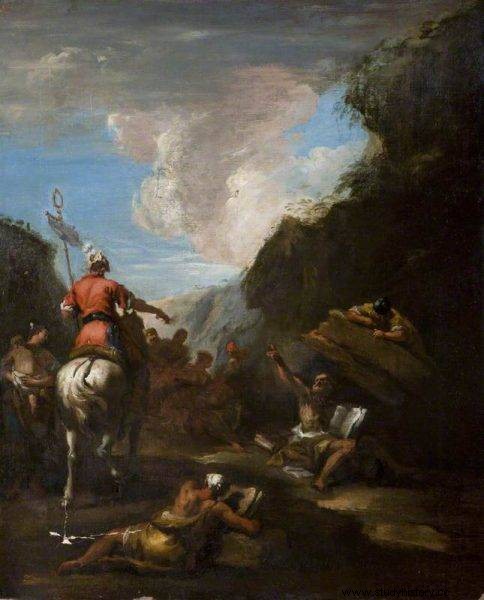They established a rogue state from which they raided the cities of Sicily, terrorizing their inhabitants. They managed to defeat the famous Pyrrus, and then ... were lost in the darkness of history. Before that happened, however, they became the spark that lit the fire of the First Punic War. Who were the Mamertines?
While it can be difficult to trace the deeper causes of the conflict, the incidents that provided the sparks that started the fire are usually more obvious, such as Princip's murder of Archduke Ferdinand in Sarajevo in 1914 CE, which threw Europe into the First World War.
In the case of the war between Carthage and Rome, these events took place in Messana (today's Messina), Sicily; they were a consequence of the career of the tyrant Syracuse Agathocles, who captured the city in the years 315–312.
Fighting the Carthaginians for many years and expanding the sphere of influence of his city, Agathocles used the services of numerous mercenary soldiers . Among his troops was a detachment of mercenaries recruited from Campania, Oski-speaking descendants of the mountain tribes that invaded the fertile plain in the last quarter of the 5th century.
Warriors of the god Mars
In the political chaos that ensued in Syracuse after Agathocles' death in 289, the group failed to find a new employer. At some point over the next few years, these mercenaries were allowed into Messana as friends, but treacherously murdered the inhabitants by appropriating their wives and property.
Having made this city their base, they raided neighboring territories, forcing other communities to pay tribute to them and taking advantage of the chaotic situation on the island. To emphasize their military power, they called themselves the Mamertines, followers of Mamers, the Italian god of war, whom the Romans worshiped as Mars.

To emphasize their military power, they called themselves the Mamertines, followers of Mamers, the Italian god of war, whom the Romans worshiped as Mars.
Messana (today Messina) is located on the northeastern coast of Sicily, on the narrow strait that separates the island from Italy. On the Italian shore lies Regium (today Reggio), a city allied with Rome, which asked for a Roman garrison to defend against Pyrrus. The Romans responded by sending four thousand men under the command of a certain Decius, an officer of undefined rank.
Being Roman citizens in every way other than not having the right to vote in Rome, these soldiers were also Oski-speaking Campania. Inspired by their compatriots in Messana, they too turned against the city they were meant to protect by murdering or driving away its male population and grabbing belongings.
The Romans, preoccupied with the wars with Pyrrus and Taranto at the time, were unable to avenge this adultery immediately, so it was not until AD 271 that the army marched south and besieged the Regium.
Crime and Punishment
The defeat of Taranto cemented Rome's control over the overwhelmingly Greek south of Italy, so it became all the more important to demonstrate to the new allies that such abuses of the Roman fides (faith) will not go unpunished.
The region was conquered after a long siege, and three hundred Campanians captured alive were sent to Rome for public punishment. There, as citizens who turned against the state, were flogged and beheaded at the Forum . One source claims that the blind Decius was carelessly guarded and managed to commit suicide before he met his fate. So far the Romans have had no connection or contact with Messana.

The text is an excerpt from the book by Adrian Goldsworthy "The Fall of Carthage. A History of the Punic Wars ”, which has just been released by Rebis.
The Mamertines did not join Pyrrus's campaign against Carthage when he responded to Syracuse's call to defend Greek cities on the island and made a brief, spectacular, but ultimately unsuccessful foray into Sicily. However, stripped of their allies beyond the Strait of Messina, they have come under increasing pressure since a new leader appeared in Syracuse.
Hieron was a gifted soldier and skillful politician who owed his popularity to campaigns against the Italian invaders. Initially brought to power by the army, he strengthened his position by marrying the daughter of one of the city's leading politicians.
Fall of power
The exact timeline of Hieron's campaign against the Mamertines is very uncertain, but we don't need to worry about that here. In the first battle, on the Cyamosorus River, he seems to have stopped them, deliberately sending a contingent of unsure mercenaries to their deaths. Later, probably between AD 268 and AD 265, he won a decisive victory over the Longanus River, hiding a detachment of Messana's original citizens and a select unit from Syracuse in an ambush behind enemy lines.
The power of the Mamertines has been broken; Seeing no chance of salvation without outside support, their leaders - or, according to Polybius, two different factions within the leadership - sent envoys to Rome and Carthage in AD 265 for help.

Hieron was a gifted soldier and skillful politician who owed his popularity to campaigns against the Italian invaders.
Again, the exact chronology of these events is not clear. We know, however, that the Carthaginians were the first to respond and one of their commanders in Sicily sent a symbolic force to man the Messan citadel . In one version of the story, this officer, named Hannibal, happened to be with a squadron of ships off the coast of the nearby Aeolian Islands. He rushed to Hieron's camp, allegedly to congratulate him on his victory, in fact to hold his offensive long enough to induce the Mamertines to accept the alliance and install a Carthaginian garrison.
Hieron did not want to go into open war with Carthage, so he retired to Syracuse. It may just be another story of Punic cunning; Polybius does not mention it, but it does not necessarily conflict with his version.
There is nothing surprising in the fact that joining the dispute was attractive to the Carthaginians. Syracuse, the richest and most powerful of them all, has always led the main resistance from the Greek cities in their centuries-old struggle to rule over Sicily. Allowing another strong tyrant to come to power there, in the glory of annihilating another group of foreigners who had attacked the Sicilian Greeks, was clearly undesirable.
Control of Messana, and with it of the most direct route to Italy, increased Carthage's power. Whether this would inevitably lead to its final subjugation of Syracuse and complete the conquest of all of Sicily, as some later sources claim, is more debatable.
Source:
The text is an excerpt from Adrian Goldsworthy's book The Fall of Carthage. A History of the Punic Wars ”, which has just been released by Rebis.
